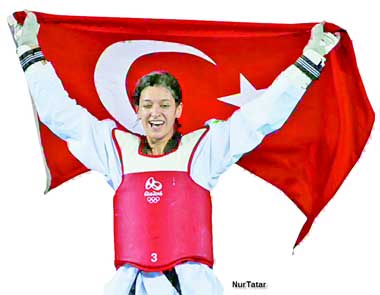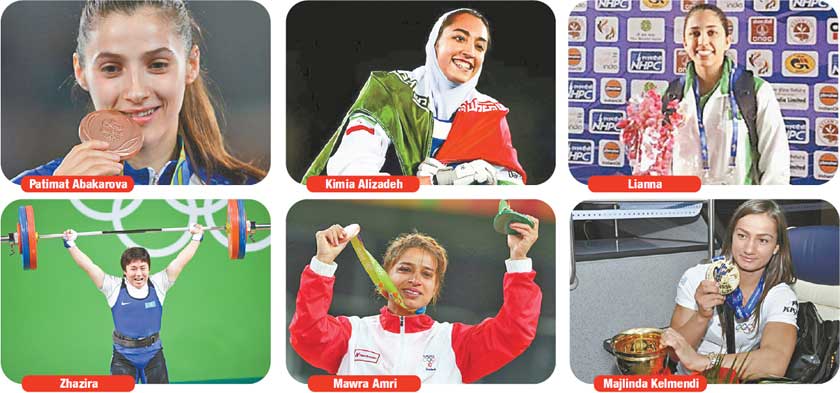The recently concluded Rio Olympics saw many Muslim women participating and winning medals as well. You! takes a look...
The recently concluded Rio Olympics saw many Muslim women participating and winning medals as well. You! takes a look...
When it comes to participation in sports, Muslim women used to take a backseat due to cultural and religious taboos. However, this was not the case in the recently concluded Rio Olympics which proved to be a milestone for Muslim women in more than one way. There were not only many first time entries of Muslim women from all over the world but they also picked up as many as 14 medals. Without a doubt, these women have become a source of inspiration for all of us. Read on to find out more...

Dalilah Muhammad (US)
Dalilah Muhammad powered to a brilliant victory in the women’s 400m hurdles in Rio and became the first winner of the event from the United States in Olympic history. The 26-year-old is also the fastest woman in the world.
She blasted out of the blocks and held on to a commanding lead for a deserved gold in 53.13 seconds. Since the event was introduced for women at the 1984 Los Angeles Games, US runners have taken silver on no fewer than five occasions. Dalilah Muhammad’s triumph ended a frustrating story of near-misses and heartache for American women in what is one of the most demanding events in track and field.
Kimia Alizadeh (Iran)
The talented 18-year-old became the first woman from Iran to ever to win an Olympic bronze medal in taekwondo. Alizadeh, draped in the Iranian flag, celebrated her victory in Rio where she clinched the medal, beating Nikita Glasnostic of Sweden 5-1 in the taekwondo under-57kg division. Even conservatives voiced their satisfaction over the teenager’s win. Fars news agency claimed that “Kimia made history” and said in a report that the bronze medal she won “is worth gold”. In keeping with Iran’s strict Muslim custom, the teenager competed wearing a head scarf over her taekwondo outfit. Alizadeh’s victory was also celebrated on social networks by many of her compatriots.
Hedaya Malak (Egypt)
Hedaya Malak (also known as Hedaya Wahba) is a 23-year-old Egyptian taekwondo practitioner. She defeated Belgium’s Raheleh Asemani in the bronze-medal event of the women’s 57 kg Taekwondo event, winning Egypt’s third medal at the Rio 2016 Olympic Games. The victory marks the first time an Egyptian woman has won a medal in taekwondo at the Olympic Games.
Sara Ahmed (Egypt)
Egyptian athlete Sara Ahmed became the first woman from an Arab country to win an Olympic medal in weightlifting. Sara Ahmed won bronze in the women’s 69 kg weight class, lifting a combined weight of 255 kg. She finished behind China’s Xiang Yanmei who took gold and Kazakhstan’s Zhazira Zhapparkul, who claimed silver. The 18-year-old is also the first Egyptian woman to win an Olympic medal in the country’s 104-year history at the Games.
Kariman Abuljadayel (Saudi Arabia)
One of the highlights of the Rio Olympics came from nowhere else than Saudi Arabia, when its female Sprinter Kariman Abuljadayel participated in the women’s 100 metre race covered from head-to-toe. Although 22-year-old Abuljadayel could not qualify for the final event as she finished at the seventh spot, but she made history being the first ever woman from the Kingdom in the sprint 100m.Completely dressed up in the sweltering heat, Abuljadayel’s efforts drew admiration and surprise from several circles.
Madiea Ghafoor (Netherlands)
23-year-old athlete Madiea Ghafoor created history when she became the first Baloch girl to take part in the Olympics. Madiea Ghafoor represented the Netherlands in the 4x400m relay along with her team in Rio. She was born and raised in Amsterdam. Her parents hail from Lyari, Karachi, and she is the granddaughter of the late Lal Baksh Rind, a senior politician whose diverse work included striving for the betterment of the relatively impoverished locality in Karachi.
Lianna (Pakistan)
The 19-year-old Bahrain-born swimmer represented Pakistan at Rio Olympics in the 50m freestyle event. Lianna’s father is British while her mother is of Pakistani origin. According to her, she faced the dilemma of contrasting choices when it came to selecting the country to represent but she ultimately chose to represent Pakistan. Lianna Catherine Swan competed with seven other swimmers, with a total of 92 swimmers in the category vying to earn a berth in the semi-finals. The Bahrain-born swimmer booked her place in the Olympics through a wild-card entry, granted by the International Swimming Federation on the basis of her performance at the 16th World Aquatics Championship in Kazan, Russia last year.
It is worth mentioning here that Lianna, in the recent past (prior to Olympics), won gold and silver medals in the women’s 200m and 100m breaststroke events respectively while representing Pakistan (the birth country of her mother) at the 2016 South Asian Games which were held in India.

Majlinda Kelmendi (Kosovo)
This woman emerged as the first athlete from her country to win an Olympic medal. She competed in the final of the women’s 52 kg judo. She has won two world titles and three European crowns during the last three years.
Aliya Mustafina (Russia)
Russian gymnast Aliya Mustafina took home three medals from the Rio Olympics. She won a gold medal in the women’s uneven bars, a silver in the women’s team all-around event, and bronze in the individual all-around event. She hails from a family which is known for sports feats and she has kept the tradition of winning medals alive. Her father, Farhat Mustafina was a bronze medallist at the 1976 Olympics in Montreal in Greco-Roman wrestling.
Ibtihaj Muhammad (US)
Ibtihaj Muhammad is the first US athlete to compete at the Olympics wearing a hijab and winning a bronze medal. She was a part of the team who came third in the women’s team sabre fencing. The team hadn’t won any medals all year and Ibtehaj Muhammad described them as ‘underdogs’. Through her experience at the Olympic Games, she broke the stereotypes and misconceptions that people have about Muslims and African-Americans.
Maria Stadnik (Azerbaijan)
28-year-old Maria Stadnik, won her nation a silver medal in the women’s freestyle 48 kg event.
Zhazira (Kazakhstan)
Zhazira won a silver medal in the women’s 69 kg final event for weightlifting.
Sri Wahyuni Agustiani (Indonesia)
Sri Wahyuni Agustiani from Indonesia competed in the women’s 48 kg weightlifting competition, and won a silver medal for her nation.
Patimat Abakarova (Azerbaijan)
Azerbaijan’s female taekwondo fighter, Patimat Abakarova (weight category up to 49 kg) won the bronze medal. Patimat gained a victory over France’s Yasmina Aziez.
Marwa Amri (Tunisia)
The 27-year-old Tunisian wrestler Marwa Amri won the bronze medal in under-58 kg women’s wrestling at the Rio Olympics. She defeated Yuliya Ratkevich of Azerbaijan. It was the second medal for Tunisia in these Olympics. The first one, also a bronze, was won by Ines Boubakri in women’s fencing.
Nur Tatar (Turkey)
Turkey’s Nur Tatar, 24, beat Chia-Chia Chuang of Chinese Taipei and won the bronze medal in taekwondo - 67 kg category contests.
Did you know?

History shows...
The 1900 Olympic Games also called the II Olympiad took place in Paris from May 14 to October 28, 1900. That was the first time that women took part in the Olympic Games, which was four years after the first Olympic Games of the modern era in Athens. A total of 22 women out of 997 athletes competed in just five sports: tennis, sailing, croquet, equestrian and golf. However, golf and tennis had events for women only. With the passage of time female participation has increased steadily. Here are some facts...